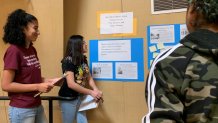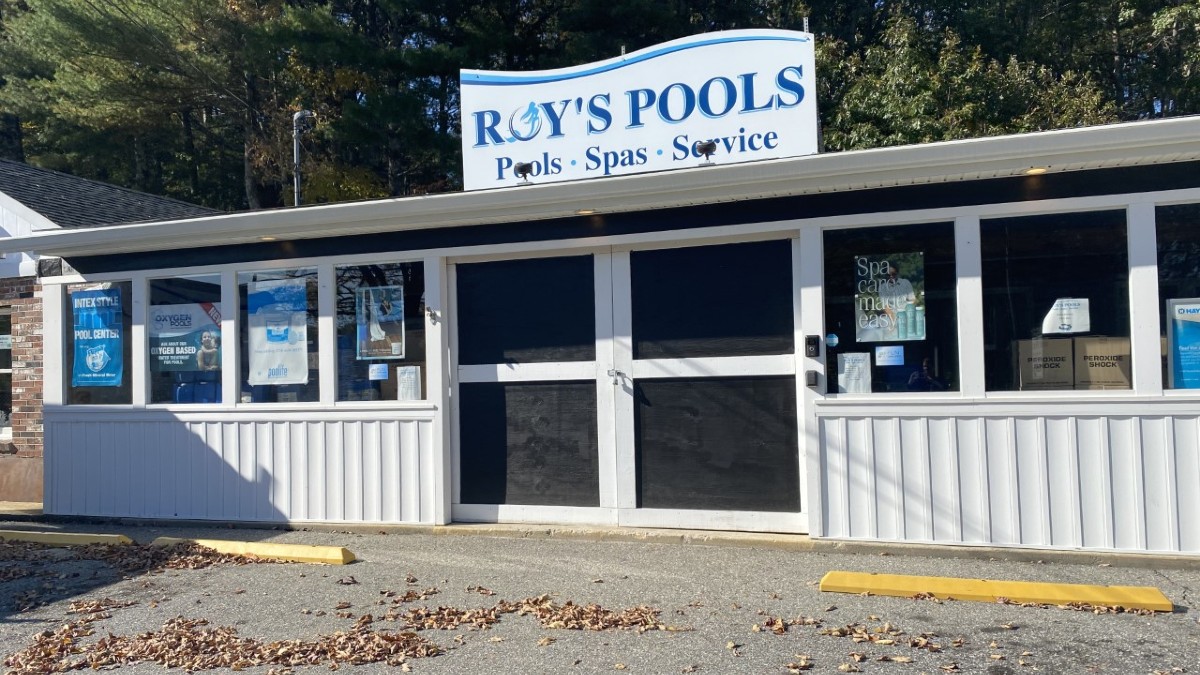This Black History Month, students at Metropolitan Business Academy chose a project that shed light on people they don’t often hear about, and put them on display for the whole school to see.
“My part of the project focused around slaves who sued for their freedom,” said Nyasia Rivera. “Specifically, about a slave named Mum Bett.”
Stories like that of Mum Bett, later known as Elizabeth Freeman, were found Friday in a pop-up museum at school called “Uncovering African American History: Black Resistance and Black Brilliance.” It’s a walking tour created by students in the school’s first African American and Latinx History class, led by teacher Nataliya Braginsky.
“The idea for this class came from young people of color across the state that went to their legislators to demand that there be African American and Latinx history as part of the state curriculum,” said Braginsky.
Those students won that fight. The classes will become mandatory in 2022, but Braginsky didn’t wait. She was already teaching American Studies, so she adopted some of those lessons in the new class.
She also took courses at Yale New Haven Teacher’s Institute, did a lot of reading and research, and consulted with other educators and her students.
“Most importantly last year I surveyed students at the end of the year to get their input and their insight on what they wanted to see in the class,” said Braginsky.

“The unanimous decision was we didn’t want to only talk about slavery and the things that kept black people down,” said E’moni Cotten. “We wanted to talk about things that would uplift us and as you can see from the whole exhibit, we did a really great job of learning about all of that.”
Local
Braginsky came up with a curriculum this summer and the school gave the yearlong class approval.
“The administration jumped on board they were incredibly supportive. They agreed this was a class we could have been teaching years ago,” said Braginsky.
Friday’s museum was one of many hands-on projects the students work on all year long. This fall they created a historical Google Map "An African-American, Indigenous, and Latinx Peoples' History of New Haven: Virtual Walking Tour."
“I like learning about my black side, and I like learning about my Puerto Rican side and this class just crams them together, and I think that’s a great thing to do,” said Julianna Roman, a junior.
The students worked in groups sharing a part of history by presenting sections from “African Roots,” to “The Abolition Movement,” and “Black Communism.” Each presentation started with what students say they were “led to believe” by more traditional lessons on black history, and followed with an oral history on what they learned in class.
Rivera worked on The Abolition Movement and Resistance to Slavery. She said she found Mum Bett’s story inspiring.
“Here’s a woman who sought out help and took it to court herself, and took it upon herself, to set herself free,” said Rivera. “I had no idea that slaves sued for their freedom. I didn’t even know they had the power to go to court.”
Students are using the exhibit, and the class, to go beyond the civil rights lessons they typically hear about.
“We learned about kings and queens in Africa that I never heard of,” said Alyssa Washington, a junior.
“Definitely learning about the Civil War from the black perspective and how they fought for their freedom, it definitely gave me a new perspective,” said Angel Rovira.
Enyce Culbreath worked with Rovira and Rivera on The Abolition Movement. Culbreath says John Parker’s story hit close to home. The abolitionist helped people to freedom on the Underground Railroad, and even paid for his own freedom.
“He was only 18, I am 18, said Culbreath. “He was so young. It’s crazy how a person could do that, to buy their own freedom.”
Roman took a look at Marcus Garvey, who she said was an early influencer to heroes she so often hears about.
“He influenced the people we learn about in school today like Malcolm X and Martin Luther King,” said Roman. “I didn’t know what he did so that was such a really big eye-opener to me. Like ‘wow he really did all this’ and my school never taught me about it? That’s crazy.”
That reaction was a similar one from students who say they were surprised to learn not only about people but cultures and history. Kaleeah Ramos is from Puerto Rico and was frustrated to learn people there won’t be able to vote in the upcoming election.
“Learning that made me be like wow, that’s crazy that we’re a U.S. territory and we don’t get to vote for who’s in charge,” said Ramos. The class has encouraged her to look into ways that could change.
She said she and others felt the class has given them a sense of pride in their culture, and will motivate them as they move through life.
“I think it’s inspiring to know that when people think blacks don’t fight for themselves or they don’t fight for their rights, or the same goes for Latinx people, it’s like, no they actually strategize,” said Ramos. “They actually help their people.”



